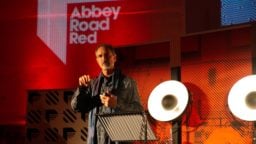LifeScore Music, an artificial intelligence music technology company co-founded by Siri co-inventor and respected AI expert Tom Gruber, has launched its own record label called Kaleidoscope.
The startup says the label will feature music composed and performed by artists, “then amplified with LifeScore’s generative AI technology”.
The Kaleidoscope team collaborates with sound designers and professionals globally to compile what it calls ambisonic recordings. These recordings are interwoven with musical elements to evoke “a sense of time and place”, LifeScore said.
“What if you could take the tracks you love so much and experience them in a totally new, different way?” asks Mary Lockwood, LifeScore’s Chief Audio Officer.
“Whether we’re working with an artists’ existing catalog, or creating our own new music, the original compositions always remain at the center of the creative process. The technology is simply there to bring in a surprise factor at the end – to create an experience that’s still uniquely that artist’s music, but colored by something new and delightful.”
Kaleidoscope will introduce a collection of immersive albums this fall, starting with five wellness-oriented releases composed and performed by Kaleidoscope’s in-house team of musicians.
“Whether we’re working with an artists’ existing catalog, or creating our own new music, the original compositions always remain at the center of the creative process.”
Mary Lockwood, LifeScore
These include Riverside Flow, tailored for yoga sessions; Skywalk, a rainforest journey; Castles In the Sand, a serene beach soundscape; Alpenglow, a walk through the mountains; and an 8-hour sleep experience titled Twilight Jungle.
Aside from original content, Kaleidoscope will also introduce several collaborations with artists, including a reimagined version of Sleeping At Last’s Atlas: Space compilation, extended as a long-play sleep album, set for release later this fall.
Kaleidoscope will release new music every Friday throughout October. On Friday (October 6), the label rolled out Riverside Flow.
Kaleidoscope is built on LifeScore’s generative technology, which reinterprets and remixes original music that “extend the original composition.”
LifeScore says its process begins with raw materials sourced from world-renowned studios and master recordings provided by artists. These recordings undergo transformation through the company’s patented technology, generating remixes and variations with new musical themes or supporting activities such as sleep, energy, relaxation, and focus.
“Instead of training on a large catalog of many artists, LifeScore’s technology can transform a single composition or album of music and generate fresh, new variations.”
Tom Gruber, LifeScore
“Instead of training on a large catalog of many artists, LifeScore’s technology can transform a single composition or album of music and generate fresh, new variations. We think this is the proper role of AI – to augment, rather than automate, human creativity,” said Tom Gruber, LifeScore’s Chief Technology Officer.
LifeScore is a graduate of the Abbey Road RED Incubator 2019 program.
Last year, Warner Music Group joined LifeScore’s £11 million (approx. USD $13 million) series A funding round led by Octopus Ventures and participated IDEO and 4 Good Ventures. That round brought the startup’s total funding to £12 million.
Warner Music CEO Robert Kyncl recently predicted that the music business will be ahead of other industries when it comes to exploiting the potential of AI, and it will also – out of necessity– be ahead on the issue of how to regulate and monetize the use of AI by non-rights-holders.
“Music – because it’s so broadly distributed and it’s so well aligned with the internet, because it’s short format, it lends itself to recommendations, it’s on all platforms – is generally first in most transformations and most innovations. So it digitizes first,” Kyncl said last month at the Code Conference in Laguna Niguel, California.
Asked when that sea change will occur, Kyncl said: “I would say within the next year you will see lots of evolution around AI… What you will likely see is increasing quality at a very fast pace.”Music Business Worldwide


